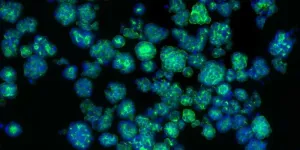(Press-News.org) Whether improperly closing a door or shanking a kick in soccer, our brains tell us when we’ve made a mistake because these sounds differ from what we expect to hear. While it’s long been established that our neurons spot these errors, it has been unclear whether there are brain cells that have only one job—to signal when a sound is unexpected or “off.”
A team of New York University neuroscientists has now identified a class of neurons—what it calls “prediction-error neurons”—that are not responsive to sounds in general, but only respond when sounds violate expectations, thereby sending a message that a mistake has been made.
“Brains are remarkable at detecting what’s happening in the world, but they are even better at telling you whether what happened was expected or not,” explains David Schneider, an assistant professor in NYU’s Center for Neural Science and the senior author of the study, which appears in JNeurosci. “We found that there are specific neurons in the brain that don't tell you what happened, but instead tell you what went wrong.”
The paper’s authors add that the results could potentially help better illuminate the learning process, identify the causes behind certain afflictions, and spot sound-related aptitudes.
“Neurons like these might be vital in learning how to speak or how to play a musical instrument,” observes Nicholas Audette, a postdoctoral fellow in NYU’s Center for Neural Science and the paper’s lead author. “Both of those behaviors involve lots of trial and error, lots of mistakes, and lots of learning from mistakes.”Schneider added, “Do expert musicians have better prediction error neurons than novices? And in diseases in which speech is underdeveloped, are prediction error neurons malfunctioning?”
Behaviors often have predictable sensory consequences. For example, when shutting a car door, we expect to hear an anticipated “thump” at a particular phase of our arm movement. And these behaviors are not limited to humans—monkeys, mice, and other animals can learn to predict what sound a movement will produce and when that sound will occur.
Previous research has shown that in the brains of humans and other animals, neurons have significant responses when a sound violates the animal’s expectation and weaker responses when a sound matches expectation. But it had been unclear whether there were neurons that only had one job—to signal when a sound was unexpected.
To address this question, Schneider and Audette built upon their previous work, which uncovered how the brain makes distinctions between “right” and “wrong” sounds. In the new JNeurosci study, they studied responses in mice through a series of experiments and by isolating neuronal activity.
In the experiments, the mice heard a particular sound after pressing on a lever. This was done repeatedly, until they associated this sound when pressing. The researchers then altered the sounds the mice heard in making subsequent presses—a method designed to mimic unexpected sounds humans hear when making errors.
The scientists found that many of the mice’s neurons (“prediction-error neurons”) were silent—meaning that they did not produce signals that could be used by other parts of the brain—except for when the mice made a movement and heard something unexpected.
More specifically, they found that individual prediction-error neurons in the mice’s auditory cortex not only signaled when something went wrong, but they also signaled what went wrong.
For example, every time the sound was too quiet, one group of prediction-error neurons was activated. However, when the sound was the expected volume but came too late, a completely different group of prediction-error neurons was active.
“When a movement makes an unexpected sound, it can violate our expectations in a lot of different ways,” explains Schneider. “Different neurons are active when a movement makes too quiet a sound, and other neurons when the movement makes the wrong sound.”
This research was supported by a grant from the National Institutes of Health (R01-DC018802).
# # #
END
How do our brains tell us what went wrong?
New study identifies the neurons that have one job: to detect the unexpectedly erroneous
2023-10-06
ELSE PRESS RELEASES FROM THIS DATE:
New pathways of Alzheimer's disease identified
2023-10-06
Dementia, which includes Alzheimer's disease, currently affects around 1.8 million people in Germany. The exact cause has not yet been clarified, but genetic factors play a significant role in the development of the disease. Most previous analyses aimed at the identification of novel Alzheimer's genes used, a "case-control design". "With this conventional and highly simplistic analysis strategy, a vast amount of clinical information is lost that can be valuable for elucidating new disease mechanisms," says Prof. Dr. Lars Bertram, head of the Lübeck Interdisciplinary Platform for Genome Analysis at the University ...
Consistent metabolism may prove costly for insects in saltier water
2023-10-06
Increased salinity usually spells trouble for freshwater insects like mayflies. A new study from North Carolina State University finds that the lack of metabolic responses to salinity may explain why some freshwater insects often struggle in higher salinity, while other freshwater invertebrates (like mollusks and crustaceans) thrive. Salinity in this case refers to the concentrations of all the salts in an aquatic environment, not just sodium.
“Freshwater habitats in general are getting saltier for a number of reasons, including road salt and ...
Clinical trials: two arms are better than one
2023-10-06
The German Institute for Quality and Efficiency in Health Care (IQWiG) has responded critically to a reflection paper by the European Medicines Agency (EMA) on the approval of new drugs based on single-arm studies. The EMA correctly points out that studies without a control arm are subject to bias and that, in general, it is hardly possible to estimate causal effects from them. However, it does not provide clear criteria for limiting drug approval based on such studies to extremely rare exceptional cases.
The FDA shows how to do it
There is also no recommendation on external controls - in contrast to guidance published ...
The efficient perovskite cells with a structured anti-reflective layer – another step towards commercialization on a wider scale
2023-10-06
Perovskite-based solar cells, widely considered as successors to the currently dominant silicon cells, due to their simple and cost-effective production process combined with their excellent performance, are now the subject of in-depth research. A team of scientists from the Fraunhofer Institute for Solar Energy ISE and the Faculty of Physics at the University of Warsaw presented perovskite photovoltaic cells with significantly improved optoelectronic properties in the journal Advanced Materials and Interfaces. Reducing optical losses in the ...
BU researcher awarded $3.7 million to study how endothelial cell health impacts disease
2023-10-06
(Boston)—Naomi Hamburg, MD, the Joseph A. Vita Professor of Medicine at Boston University Chobanian & Avedisian School of Medicine, has been awarded a five-year, $3.7 million grant from the National Heart, Lung and Blood Institute for her research study, “Endothelial Cell Health Across the Spectrum of Cardiometabolic Disease.”
Cardiometabolic diseases are a group of common but often preventable conditions including heart attack, stroke, diabetes, insulin resistance and non-alcoholic fatty liver disease. The escalating prevalence of cardiometabolic risk factors including obesity and type 2 diabetes mellitus (T2DM) ...
Autoimmune and autoinflammatory connective tissue disorders following COVID-19
2023-10-06
About The Study: COVID-19 was associated with a substantial risk for autoimmune and autoinflammatory connective tissue disorders in this retrospective cohort study, indicating that long-term management of patients with COVID-19 should include evaluation for such disorders.
Authors: Solam Lee, M.D., Ph.D., of Yonsei University Wonju College of Medicine in Wonju, Republic of Korea, is the corresponding author.
To access the embargoed study: Visit our For The Media website ...
Cancer research: Metabolite drives tumor development
2023-10-06
Cancer cells are chameleons. They completely change their metabolism to grow continuously. University of Basel scientists have discovered that high levels of the amino acid arginine drive metabolic reprogramming to promote tumor growth. This study suggests new avenues to improve liver cancer treatment.
The liver is a vital organ with many important functions in the body. It metabolizes nutrients, stores energy, regulates the blood sugar level and plays a crucial role in detoxifying and removing harmful components and drugs. Liver cancer is one of the world’s most lethal types of cancer. Conditions that cause liver cancer include obesity, excessive ...
Patterns in physician burnout
2023-10-06
About The Study: The findings of this survey study involving 1,373 physicians and three survey periods suggest that the physician burnout rate in the U.S. is increasing. This pattern represents a potential threat to the ability of the health care system to care for patients and needs urgent solutions.
Authors: Marcus V. Ortega, M.D., of Massachusetts General Hospital in Boston, is the corresponding author.
To access the embargoed study: Visit our For The Media website at this link https://media.jamanetwork.com/
(doi:10.1001/jamanetworkopen.2023.36745)
Editor’s Note: Please see the article for additional information, including ...
Rise in overdose deaths increasingly affects those with lower educational attainment, RAND study finds
2023-10-06
Drug overdose deaths increased sharply among Americans without a college education and nearly doubled over a three-year period among those who don’t have a high school diploma, according to a new RAND Corporation study. The findings further highlight a potential association between the rise in drug overdose deaths and barriers to education access, a social determinant of health.
Lower educational attainment has been one of the socioeconomic factors historically associated with drug use and overdose deaths, but the emergence of fentanyl in street drugs and the rise of the COVID-19 ...
Deciphering the intensity of past ocean currents
2023-10-06
Details of past climate conditions are revealed to researchers not only by sediment samples from the ocean floor, but also by the surface of the seafloor, which is exposed to currents that are constantly altering it. Deposits shaped by near-bottom currents are called contourites. These sediment deposits contain information about past ocean conditions as well as clues to climate. Contourites are often found on continental slopes or around deep-sea mountains. But they can be found in any environment where strong currents occur near the seafloor. The mechanisms that control them are not yet well understood. ...
LAST 30 PRESS RELEASES:
The Lancet: Single daily pill shows promise as replacement for complex, multi-tablet HIV treatment regimens
Single daily pill shows promise as replacement for complex, multi-tablet HIV treatment regimens
Black Americans face increasingly higher risk of gun homicide death than White Americans
Flagging claims about cancer treatment on social media as potentially false might help reduce spreading of misinformation, per online experiment with 1,051 US adults
Yawns in healthy fetuses might indicate mild distress
Conservation agriculture, including no-dig, crop-rotation and mulching methods, reduces water runoff and soil loss and boosts crop yield by as much as 122%, in Ethiopian trial
Tropical flowers are blooming weeks later than they used to through climate change
Risk of whale entanglement in fishing gear tied to size of cool-water habitat
Climate change could fragment habitat for monarch butterflies, disrupting mass migration
Neurosurgeons are really good at removing brain tumors, and they’re about to get even better
Almost 1-in-3 American adolescents has diabetes or prediabetes, with waist-to-height ratio the strongest independent predictor of prediabetes/diabetes, reveals survey of 1,998 adolescents (10-19 years
Researchers sharpen understanding of how the body responds to energy demands from exercise
New “lock-and-key” chemistry
Benzodiazepine use declines across the U.S., led by reductions in older adults
How recycled sewage could make the moon or Mars suitable for growing crops
Don’t Panic: ‘Humanity’s Last Exam’ has begun
A robust new telecom qubit in silicon
Vertebrate paleontology has a numbers problem. Computer vision can help
Reinforced enzyme expression drives high production of durable lactate-based polyester
In Rett syndrome, leaky brain blood vessels traced to microRNA
Scientists sharpen genetic maps to help pinpoint DNA changes that influence human health traits and disease risk
AI, monkey brains, and the virtue of small thinking
Firearm mortality and equitable access to trauma care in Chicago
Worldwide radiation dose in coronary artery disease diagnostic imaging
Heat and pregnancy
Superagers’ brains have a ‘resilience signature,’ and it’s all about neuron growth
New research sheds light on why eczema so often begins in childhood
Small models, big insights into vision
Finding new ways to kill bacteria
An endangered natural pharmacy hidden in coral reefs
[Press-News.org] How do our brains tell us what went wrong?New study identifies the neurons that have one job: to detect the unexpectedly erroneous


